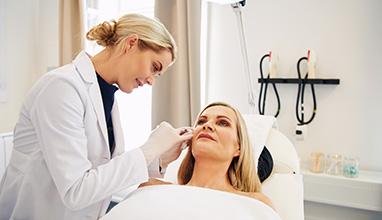Being a dermatology nurse can be a very rewarding career, but in order to be truly successful, there are some skills that you should possess. These skills will not only help you perform your job more effectively, but will also allow you to be a true asset to your employer.
Listening Skills
Dermatology involves the preservation and care of the skin as well as the treatment of various skin conditions. As such, you will be responsible for taking patient histories and determining their primary complaints—or their reason for seeking an appointment. In order to best assist the physician with forming a diagnosis, you will need to possess good listening skills so that you can pick out potential causes for the skin condition. For instance, if the patient’s chief complaint is a persistent rash and he mentions that he recently acquired a new pet, you may be able to deduce that the rash is caused by an allergic reaction to the new pet.
Observation Skills
Skin conditions can certainly be tricky things. While some may persist without change for weeks on end, others may present with no explanation and quickly worsen. In many cases, the only way to diagnose a skin condition is to monitor the patient for changes. In this regard, you will need keen observation skills so that you can keep watch over patients and make recommendations as the condition changes. In fact, for patients who present with unusual growths, this observation could be life-saving when skin cancer is the diagnosis.
Critical Thinking Skills
Although dermatology may seem like a relatively harmless field in the medical industry, there is always the chance that something could go wrong. Sometimes rashes and other skin conditions are linked to other, more serious illnesses that can progress quickly and leave patients in poor health. There are also procedures that are performed in a dermatologist’s office such as laser skin resurfacing or Botox injections that can cause adverse reactions in patients. If this should happen, you will need to be able to think and react quickly in order to make the patient comfortable, reduce the amount of discomfort felt by the patient and perhaps even save his or her life.
Knowledge of Procedures and Machinery
Although you will not be responsible for performing most of the procedures in a dermatologist’s office, you will need a firm understanding of the procedures that are used as well as the machinery and tools used to execute them. This way, you can better answer patients’ questions and make them feel more at ease. For instance, if the patient will be receiving microdermabrasion treatments, the nurse can show the patient the machine that will be used to perform the procedure and explain how the dermatologist will use it. This will help the patient feel empowered when it comes to his or her treatment.
A dermatology nurse is required to perform many of the same duties as a nurse in a family practice setting, but you will also need to be familiar with the conditions and treatment options associated with dermatology in order to best benefit your patients.






